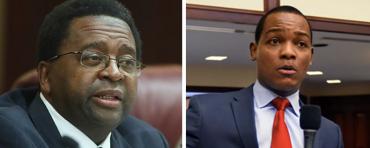
Two South Florida Democrats have filed companion Senate-House bills seeking to restore the state’s former judge-selection system to restrict partisan domination of the process and encourage diversity.
Sen. Perry Thurston, D-Fort Lauderdale, filed Senate Bill 86 and Rep. Al Jacquet, D-Riviera Beach, introduced House Bill 379, last week.
Both want the composition of the state’s 26 state judicial nomination commissions (JNC) that vet state court nominees before submitting finalists to the governor to each include only three gubernatorial appointments instead of nine.
“Florida’s current judiciary does not accurately reflect our state’s diversity,” Jacquet said in a statement. “Women and minorities are significantly underrepresented as judges in Florida in proportion to their numbers in the general population. Furthermore, the public cannot be confident that the judiciary will fulfill its promise of impartiality when judges are being selected based on politics rather than merit.”
Within weeks of assuming office in January, DeSantis appointed three justices – Robert J. Luck, 39, Barbara Lagoa, 51, Carlos Muniz, 49 – to replace three forced-retirement liberal Supreme Court judges, including the bench’s only African American, turning a conservative majority into a conservative bloc.
Democrats cried foul, noting the nine-member Supreme Court JNC, all appointed by then-Gov. Rick Scott, did not recommend any of the six African American candidates among the 59 applicants as finalists. Thus, their names were never submitted and, for the first time since January 1983, Florida’s Supreme Court does not have a black jurist.
Jacquet said the JNC system as adopted under Gov. Reubin Askew in the 1970s should be restored to the way it was before 2001 when Gov. Jeb Bush changed the bylaws, requiring all nine members of each be appointed by the governor, although four members were traditionally selected from a list provided by the Florida Bar.
Prior to 2001, three members of every JNC were selected by the governor, three by the Florida Bar and three agreed upon by the other six.
The 2001 revision has only benefited partisans, Jacquet said.
“This was not the intent of our former Gov. Reubin Askew – a champion of racial equality – had when he established the judicial nominating commissions,” he said.
SB 86 and HB 379 would require the Florida Bar to select three commissioners, the governor select three, and the six together select the final three members of each JNC.
“These bills would require that diversity in terms of race, ethnicity, disability, veteran status, gender, gender identity and sexual orientation are considered when making appointments to the judicial nominating commissions and require each entity to collect and release diversity data of the judicial nominating commissioners,” Jacquet’s and Thurston’s joint release said.
SB 86 and HB 379 would also limit the number of commissioners from the same political party on each JNC and ensure commissioners recuse themselves from consideration of judicial applicants where a personal or business relationship may create a conflict of interest.
“SB 86 limits the ability of governors and politics to directly influence the nomination of candidates for Florida Supreme Court vacancies, [but] the bill is part of a larger legislative effort to ensure that JNCs remain impartial and independent,” Thurston said in a statement. “Floridians expect better than a governor’s whim when it comes to appointing the men and women who have the power to interpret laws.”
Florida governors appoint judges to the seven-member Supreme Court and to the state’s 60-member appellate court benches. The nearly 600 judges within the state’s 20 judicial circuits are elected, but the governor appoints replacements when there are vacancies.
In addition to the three Supreme Court appointments, since assuming office DeSantis has named eight new circuit judges, including Judge Caroline Shepherd and Judge Renatha Francis to the 15th Judicial Circuit Court on Oct. 1.
During an address to the Florida Bar Annual Convention in July, DeSantis, a Harvard Law graduate and former U.S. Navy lawyer, said of the 22 judge selections he had made by then, “half have been either Hispanic, African American, or Asian American and almost half have been women.”
DeSantis said he closely evaluates every judicial appointment.
“It’s something that I take seriously,” he said. “I actually haven’t selected anybody that I haven’t personally interviewed, yet.”
DeSantis said his primary interest is appointing jurists with a background of ”judicial restraint.”
“What I really mean is you’re restraining yourself to your proper sphere,” he said. “Again, it means you want a judge who strictly confines him or herself to construing the law, applying the law, and not making the law.”
John Haughey is the Florida contributor to The Center Square.


